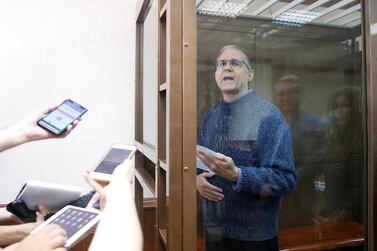A senior Russian diplomat has condemned Israeli air strikes in Syria, saying they pose a threat to regional stability and efforts to return the country to peace after eight years of conflict.
Israeli warplanes launched strikes targeting Syrian military positions in Homs and the outskirts of the capital Damascus on July 1. The attack left nine mostly foreign pro-regime fighters dead and claimed the lives of six civilians, including three children, the Syrian Observatory for Human Rights, a UK-based group monitoring the war, said.
A spokesperson for the foreign ministry, Maria Zakharova, said on Tuesday that Russia, which is a key international power broker in the conflict, was concerned by the “alarming developments”.
Syrian state news agency Sana said that a complaint had been filed to the United Nations Security Council demanding accountability for the attack.
Ms Zakharova said the Israeli attack, which she described as a violation of Syrian sovereignty, “not only prevents the normalisation of the situation in the country, but also carries the potential of destabilising the region”.
Russia emerged as an indispensable ally to Syrian President Bashar Al Assad in late 2015, when Moscow entered the conflict with an air campaign ostensibly launched against ISIS .
However, the Kremlin's brutish intervention helped the regime decimate opposition groups and win back territory lost to moderate groups and armed extremists. Since peaceful anti-government protests in 2011 morphed into all-out conflict, about 375,000 people have been killed and millions displaced.
As the United States, a traditional power broker in the Middle East, opted not to intervene militarily in the Syrian conflict, Russian President Vladimir Putin became the de facto broker in the war, which has drawn in the region’s powers and rivals. Maintaining a delicate balance has not proven easy.
The conflict is winding down to its concluding phase, with just Idlib province in the north outside of Mr Assad’s control. Russia has voiced mounting frustration over frequent Israeli air strikes in Syria, which have mostly targeted Iranian military assets and the Tehran-backed Hezbollah militant group.
Tensions between Russia and Israel peaked in September last year when Moscow blamed Israeli jets for the shooting down of an Il-20 military plane, claiming the lives of all 15 Russian personnel on board. The Israeli military expressed "sorrow" over the incident, but said the Syrian military was responsible.
A summit between top security officials from Israel, Russia and the US in Jerusalem late last month failed to bring about any concrete agreements on what the Israeli leadership has described as Iran’s malign role in Syria.
US security adviser John Bolton and Israeli security chief Meir Ben-Shabbat have adopted a hardline stance on Iranian influence in the Middle East. However, Mr Putin, alongside Turkey's President Recep Tayyip Erdogan, have spearheaded efforts to bring about a political solution to the Syrian conflict with Iranian Foreign Minister Javad Zarif.







